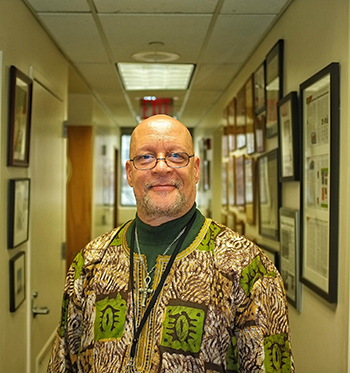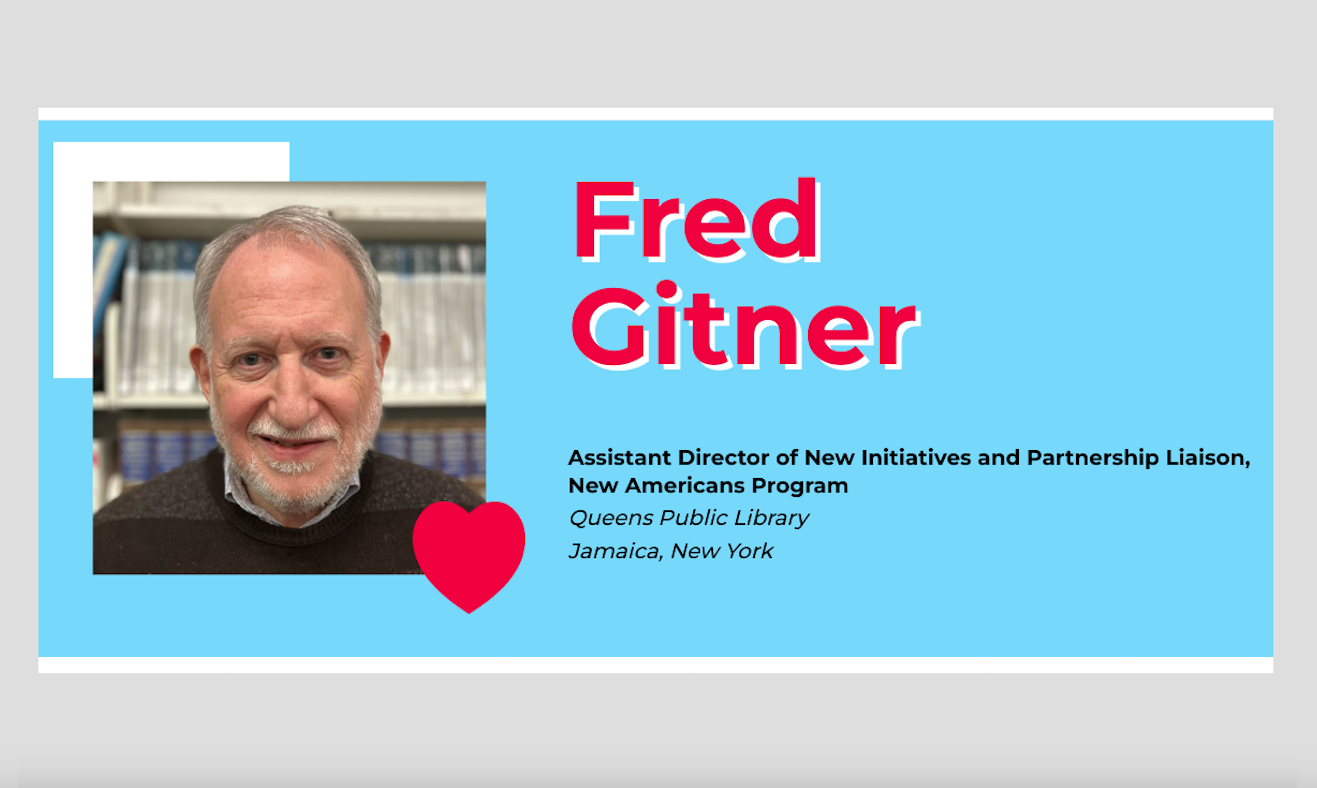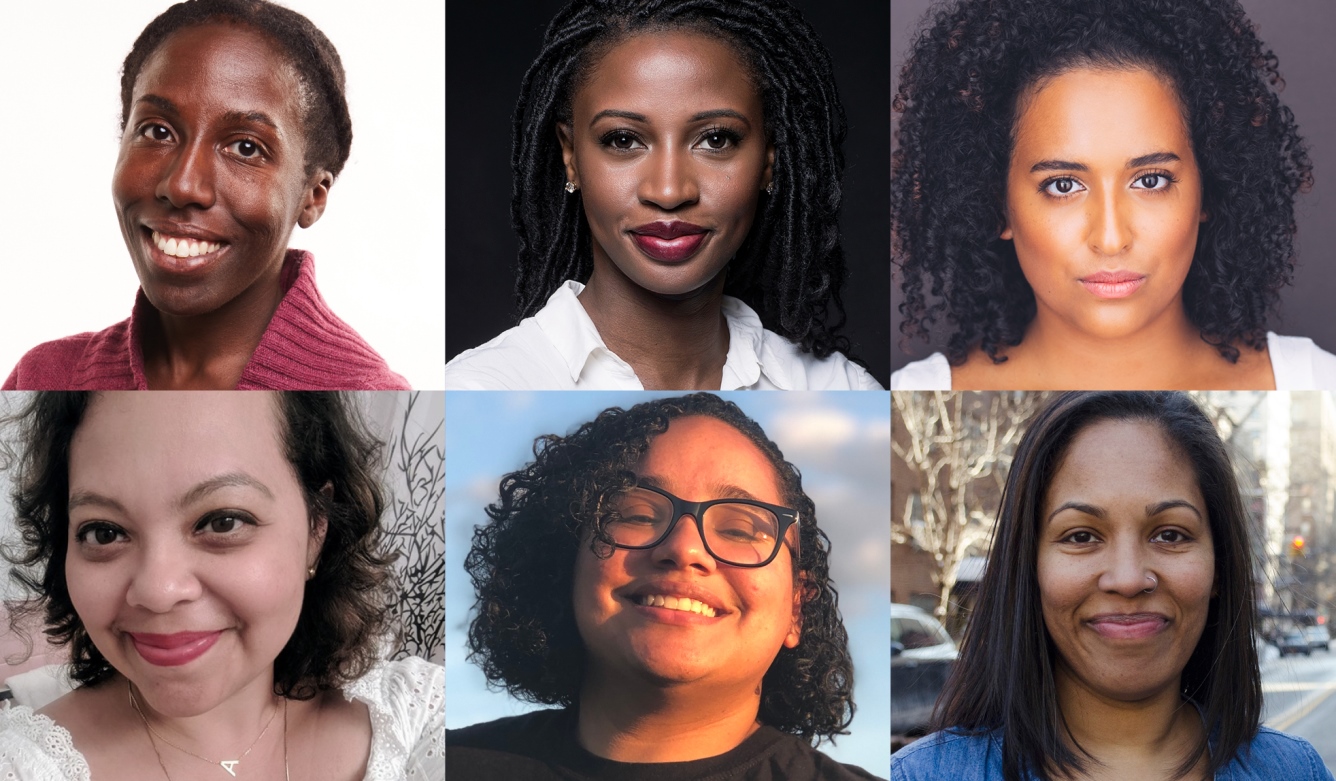Andrew Jackson (Sekou Molefi Baako) has been Executive Director of the Langston Hughes Community Library and Cultural Center since 1980. He is retiring this year, and Queens Library will miss him, as will the countless people outside the Library whose lives he has enriched. The oldest of triplets, Andrew earned his B.S. at York College (CUNY) and his MLS at Queens College Graduate School of Library and Information Studies (CUNY). Andrew provides extensive outreach to schools, libraries, community organizations, cultural institutions, and correctional facilities, and mentors graduate students and young librarians across the country. We were honored to talk with him about his life and career and the legacy he leaves behind.
When and why did you decide to become a librarian?
I worked at Langston Hughes from 1980 to 1993 before I attended graduate school at Queens College to earn my Master’s in library science. My passion was studying black history, but there were no graduate programs in black history in New York City at that time. The only options were Cornell University upstate and Temple University in Philadelphia. Since I wasn't willing to leave Langston Hughes and the Number 7 train didn't stop at either of these campuses, I decided to get my MLS to learn more about our profession. I was hooked on Langston Hughes and its role in our community and borough. But more, I was hooked on what I was doing as director to provide such rich programs and services to Queens and the broader community.
You describe yourself as an “activist librarian.” What do you think the role of libraries and librarians is in generating positive social change?
I believe we inherit the responsibility to bring libraries to the people and design programs and services that fit their needs, wants, and even the needs and wants they don't know they have. More important, we also have a responsibility to introduce librarianship as a rewarding, enriching, and exciting career to consider, which means we should be extremely interactive with our customers and communities. We need to participate in Career Days, Read-Ins, Black History programs, Library Week, and so on to expose young people to the scope and breadth of what and who librarians are, how rewarding our jobs are, the value of public libraries, and the value of reading as a crucial life skill. And we need to make the library a central part of our community’s growth and development. We can't do that if we are not at the meetings and at the table to have a voice in community affairs and community issues. Librarians have to be visible in their community outside the library’s doors.
Thus, as an activist librarian, I've served on the boards of Queens Public Television and Elmhurst Hospital Center; on the York College President's Advisory Council and Queens College Arts Committee; and on the Louis Armstrong House Museum Advisory Board, the Queens Borough President's African American Heritage Planning Committee, and the Poet Laureate Administrative Committee and General Assembly. I've spoken to school classes and assembly programs, and at black history programs and career days for over 20 years. I'm well-known because I’ve been so visible in the broader community for so long. I know all of our elected officials by first name, and they all know Langston Hughes and know me by first name because of the relationship we've developed over the years.
I've also been an active member of the Black Caucus of the American Library Association since 1992, when I attended the first National Conference of African American Librarians, and a member of the Executive Board since 1996, chairing the Professional Development and Recruitment Committee and Affiliates Committees. I served as Vice President from 2002 to 2004 and as President from 2004 to 2006, and I have remained on the board as a past president to add a voice of experience and mentor new board members. I've mentored graduate students and new ALA members across the country as part of a responsibility passed down to me by my mentors. We have to mentor by example and be visible role models for the next generation.
When there are issues, local and national, librarians have to make their voices heard, and I've been able to do that through my work with the Black Caucus and in my position at Langston Hughes.
 What are some of your proudest moments in your 35 years as Executive Director of Langston Hughes Community Library?
What are some of your proudest moments in your 35 years as Executive Director of Langston Hughes Community Library?
It's hard to identify specific proudest moments, as there have been so many, but one is surely the opening of our facility in 1999. This was a long-time dream that I had a part in making real, with a voice in design and site selection. I hope to be around for the opening of our next building expansion as well.
My other proudest moments have to be what I’ve done to grow the visibility of Langston Hughes beyond Corona-East Elmhurst and Queens County and even internationally through my own visibility and activism. Creating the annual Langston Hughes Celebrations and Kwanzaa Celebrations and hosting them for the past 31 years has also been rewarding because they bring hundreds of people to Langston Hughes, including craft vendors, performers, and audience members from across the city and beyond.
I remember back in the day when I first started inviting all these people to our events, they would react as if I were inviting them out to Montauk Point because were not familiar with Queens and thought it was such a distance. Now that has all changed.
You co-edited a book, The 21st Century Black Librarian in America, about the unique issues and challenges for black librarians. Can you describe some of them and what steps you think libraries can take to support librarians of color?
It was clear from reading the essays submitted for this book project that racism still exists in the lives of black librarians across the board in America in this 21st century. By now one would hope this was no longer the case, but it is, as tragic as that is. Too often, librarians of color are not accepted as skilled professionals. They are second-guessed at the Reference Desk and in the boardroom by both colleagues and students, and not taken seriously when making recommendations and giving ideas. Although things are better than in the 20th century, these problems do exist today.
As racism is not solely a black-or-white issue but a diversity issue, I believe libraries and academic institutions must create an environment that makes all library staff members and volunteers feel welcomed and part of the team. The ALA Code of Ethics supports equal rights for all employees. Article Five reads, "We treat co-workers and other colleagues with respect, fairness, and good faith, and advocate conditions of employment that safeguard the rights and welfare of all employees of our institutions." That’s fine in print, but this has to be reinforced from the top down, from boards of trustees to library administration. Progress has been made for sure, but evidently much work still needs to be done for every workplace to be welcoming to all.
You were given five African names in recognition of your commitment to teaching black history and creating cultural programs for the people of Queens. That sounds fascinating! Can you describe how this happened and what your names mean?
I was giving a Kwanzaa presentation for a city agency back in 1993 and booked an African drumming ensemble to perform behind me as I presented the Nguzo Saba, the Seven Principles of Kwanzaa. Prior to their performance, the MC read my bio as part of my introduction, and the performers, who knew me well, mentioned that my American name no longer fit me because of my growth and transition culturally, and that this warranted my having an African name. I gave them the task of finding it. In April 1994, we hosted a 25th Langston Hughes Anniversary Celebration, and I booked this same ensemble to perform. They ended their performance with a full Naming Ceremony where the community and I were both presented with my new names at the same time. In the African tradition, the community has to agree with these names, not just the individual.
The names I was given were: Sekou, which means “warrior”; Molefi, “He keeps tradition”; and Baako, “first born” of the Jackson Triplets. Since then, I received a South African name from a South African choir in 1996: Bhekizizwe, “Take care of your people.” And a former student from Sierra Leone gave me the name Orbai, which means “teacher,” in 1999. I'm proud of these names as I think they accurately fit who and what I've become. I choose to use both names out of respect for my American and African ancestry, and I stand on the shoulders of both.
 As a teacher of Black Studies and cultural diversity, what “beginner” books would you recommend to someone who wants to know more about the experiences and history of people of color in America?
As a teacher of Black Studies and cultural diversity, what “beginner” books would you recommend to someone who wants to know more about the experiences and history of people of color in America?
That is not an easy question to answer because there are so many works to recommend, but I highly recommend that everyone read From Slavery to Freedom by John Hope Franklin. I also recommend the children’s book Heart and Soul by Kadir Nelson, a great work with incredible illustrations. I also highly recommend They Came Before Columbus: The African Presence in Ancient America by Dr. Ivan Van Sertima.
What advice do you have for the next Executive Director of Langston Hughes Community Library?
I've received numerous messages and questions about my retirement from Langston Hughes, and many express the concern that "no one can fill your shoes or follow in your footsteps.” I certainly appreciate the praise for what we have been able to accomplish during my 35 years at the helm of this institution, and I'm most pleased that the community appreciates my work and efforts over that period. However, I don't believe anyone is indispensable or can't be replaced with the right person. So my advice to my successor is simple. Don't try to follow in my footsteps; it took me 35 years to create them. Just be passionate about the work you will do here. Serve this community and borough from your heart. Create your own path and be yourself.
Photo of Andrew Jackson by Adolfo Steve Vazquez.













